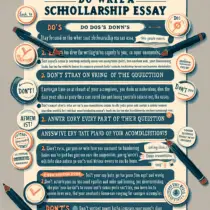
Crafting a compelling scholarship essay can be a daunting task for many students. The pressure to stand out among thousands of applicants, to effectively convey your achievements and aspirations in a limited word count, can be overwhelming. However, with the right approach and some key dos and don’ts in mind, you can create an essay that not only captures the attention of scholarship committees but also showcases your unique qualities and potential.
When it comes to crafting a compelling scholarship essay, there are a few key dos that can help set your essay apart from the competition.
**Dos:**
**1. Do Your Research:** Before you start writing your scholarship essay, take the time to research the organization offering the scholarship. Understand their values, mission, and goals to tailor your essay accordingly. Highlight how your own values align with those of the organization to demonstrate why you are the perfect candidate for their support.
**2. Tell Your Story:** A compelling scholarship essay is not just a list of achievements; it’s a window into who you are as a person. Share personal anecdotes, experiences, or challenges you’ve overcome that have shaped your journey and ambitions. Make sure to connect these stories back to how they have influenced your academic or career goals.
**3. Show, Don’t Tell:** Instead of simply stating that you are passionate about a particular field or that you possess certain qualities, provide specific examples that demonstrate these traits. For example, instead of saying “I am hardworking,” share a story about how you juggled multiple responsibilities while maintaining high grades.
**4. Be Authentic:** Scholarship committees receive countless essays each year, so it’s crucial to be genuine and authentic in your writing. Avoid using clichés or trying to sound overly polished; instead, let your unique voice shine through to make a lasting impression on readers.
**5. Follow Instructions:** This may seem obvious, but it’s important to carefully read and follow the instructions provided for the scholarship essay prompt. Make sure you meet all requirements regarding word count, formatting, and submission guidelines to ensure your application is not disqualified.
In addition to these dos, there are also several key don’ts that should be avoided when crafting your scholarship essay.
**Don’ts:**
**1. Don’t Procrastinate:** Writing a compelling scholarship essay takes time and effort, so don’t leave it until the last minute. Give yourself plenty of time to brainstorm ideas, draft multiple versions of your essay, and seek feedback from teachers or mentors before submitting the final version.
**2. Avoid Generic Statements:** Scholarship committees want to learn about who you are as an individual, so avoid using generic statements or clichés that could apply to any applicant. Instead of broad statements like “I want to make a difference in the world,” provide specific examples or experiences that illustrate this ambition.
**3. Don’t Focus Solely on Achievements:** While it’s important to highlight your accomplishments in a scholarship essay, avoid listing them without providing context or reflection. Instead of simply listing awards or honors you’ve received, explain why these achievements are meaningful to you and how they have influenced your future goals.
**4. Avoid Negativity:** It’s natural to face challenges or setbacks in life, but avoid dwelling on negative experiences in your scholarship essay. Instead of focusing on hardships or obstacles you’ve encountered, emphasize how you’ve overcome these challenges and grown stronger as a result.
**5. Don’t Use Jargon or Complex Language:** Remember that scholarship committees may include individuals from various backgrounds and fields of study who may not be familiar with technical terms or complex language related to your field of interest. Keep your writing clear, concise, and accessible so that all readers can easily understand and appreciate your essay.
In conclusion,** crafting a compelling scholarshipessay requires thoughtful planning,** genuine reflection,and strategic storytelling.It’s importantto doyour research,tellyour storywith authenticity,and followinstructionscarefullywhile avoiding procrastination,generic statements,negativity,andcomplexlanguage.By followingthese dosanddon’ts,youcan create anessaythat standsoutto scholarshipscommitteesandincreasesyour chancesof receivingfinancialsupportforyouracademicandprofessionalaspirations.
—
#### FAQ
1) **How long should my scholarship essay be?**
Most scholarships will provide specific guidelines regarding word count for essays; however,a general ruleof thumbis around500-1000 words.Checkthepromptcarefullyandsticktotherequirementsprovidedbytheorganizationofferingthescholarship.
2) **Should I include referencesin myscholarshipessay?**
Unless specifically requested bythe prompt,it isusuallynotnecessarytoreferenceresourcesorciteexternalinformationinyourscholarshipessay.Focusonsharingyournarrativeandexperiencesratherthanrelyingonsourcesorexternalresearch.
3) **What should I doifI’mstrugglingtowrite memorable contentformyscholarshipplication?**
Ifyou’refindingitdifficulttodevelopcompellingcontentforyourscholarshipapplication,reachingouttosupportivepeers,familymembersormentorsforfeedbackandinwritingworkshopsorcounselingcanbebeneficial.Theymayofferinsightfulinputtohelpyourefineyourstoryandhighlightyouruniqueattributesmoreeffectively.”






